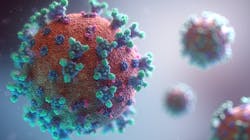WEF, CDC to expand use of wastewater-based epidemiology
WASHINGTON -- The U.S. Centers for Disease Control and Prevention (CDC) has selected the Water Environment Federation to develop, manage, and provide training for a nationwide network of water utilities, public health agencies, and laboratories participating in wastewater-based epidemiology.
Wastewater-based disease surveillance involves the testing of wastewater to evaluate the presence of pathogens among a population.
Wastewater-based disease surveillance has been used to study the presence and trends in coronavirus infections in communities and is increasingly viewed as a valuable tool during the current pandemic and for future public health research. For example, up to 80 percent of infected people pass on traces of coronavirus through their waste and so strategic sampling of wastewater can provide information on the infection trends of the virus in a community.
“Water and wastewater sector personnel are on the frontlines of ensuring the protection of public health and are able to play a central role in identifying and evaluating the presence of pathogens and other public health concerns in water,” said WEF Chief Medical Officer Dr. Andrew Sanderson. “WEF looks forward to working with CDC and the U.S. water sector on guidelines, best practices, and training that improve and expand utilization of wastewater-based epidemiology.”
CDC is working with other federal agencies and entities such as WEF to establish the National Wastewater Surveillance System (NWSS), the first government-led wastewater surveillance program in the U.S. The system will involve a network of wastewater facilities, state and local health departments, and laboratories, which WEF will help coordinate.
“WEF is uniquely positioned to partner with CDC on the national wastewater-based disease surveillance system and network through our extensive membership presence in the areas of sanitation, engineering, public health, and laboratories,” said WEF President Lynn Broaddus. “We are grateful for the opportunity to be part of CDC’s efforts to advance science and protect communities from infectious diseases.”
CDC is focused on improving public health through national partnerships to prevent and control infectious disease threats. CDC selected WEF to assist with the work. Under the agreement, WEF will conduct the following activities.
- Support CDC in the development, dissemination, and adoption of guidance and best practices for the prevention and control of infectious diseases within the water and wastewater sector.
- Develop the network for wastewater-based disease surveillance with a focus on information sharing and problem-solving.
- Target frontline wastewater and public health personnel with training in surveillance activities and advance understanding of the spread of disease in communities.
- Implement projects that pilot new approaches and technologies in wastewater-based disease surveillance.
For more information visit www.wef.org/coronavirus.
